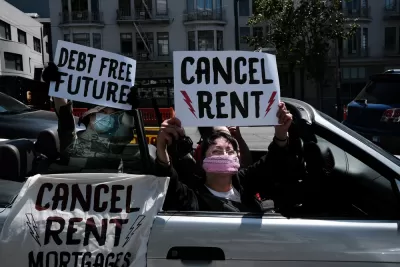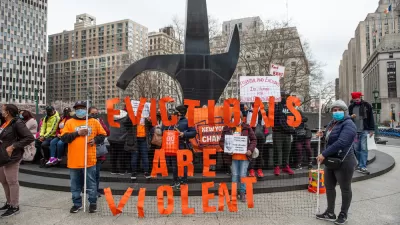The National Equity Atlas has been tracking national rent debt, which takes on new meaning since the federal eviction moratorium expired at the end of July.

Throughout the pandemic, a series of clashing data points has hung over the country like a dark cloud ready to burst. Millions of renters and property owners struggled to pay bills, falling behind on payments and racking up debt and arrears. Eviction moratoria in place at various levels of government around the country proved only sporadically effective (and frequently illegal). At the same time, poverty dropped by record levels and low-wage jobs all over the country are reportedly understaffed, presumably at least in part because people have better options. Yet, homelessness has also spiked at "devastating" rates, according to data released by the U.S. Department of Housing and Urban Development in July.
An article by Jillian Berman keeps the focus on the rent debt that has new consequences since the expiration of the federal eviction moratorium, estimating that 6.4 million households owe an estimated $21.3 billion in rent debt. The data comes from analysis of June 23 – July 5, 2021 Census Household Pulse Survey by the National Equity Atlas. '
The National Equity Atlas has created a dashboard of interactive maps and infographics to track mounting rent debt and the potential of mass evictions as "one of the most pressing equity issues created by the pandemic." The National Equity Atlas calls on policymakers to eliminate rent debt and prevent evictions.
As noted by Berman, rent debt pre-dates the pandemic, but Covid-19 likely exacerbated the problem. Although previous economic relief packages approved by the federal government have devoted $46 billion worth of rent relief funds to the growing challenge, relief funds are reaching struggling renters too slowly to effectively mitigate the risk in the rental housing market.
FULL STORY: The looming $21.3 billion in debt that could cost Americans their homes

Montreal Mall to Become 6,000 Housing Units
Place Versailles will be transformed into a mixed-use complex over the next 25 years.

Planetizen Federal Action Tracker
A weekly monitor of how Trump’s orders and actions are impacting planners and planning in America.

DARTSpace Platform Streamlines Dallas TOD Application Process
The Dallas transit agency hopes a shorter permitting timeline will boost transit-oriented development around rail stations.

Interactive Map Reveals America's “Shade Deserts”
Launched by UCLA and American Forests to combat heat-related deaths, the tool maps the shade infrastructure for over 360 U.S. cities.

Bicycles and Books — In Sacramento, Libraries Now Offer Both
Adult library card holders can check out e-bikes and e-trikes for up to one week.

Colorado Landfills Emit as Much Pollution as 1M Cars
Landfills are the third-largest source of methane pollution in Colorado, after agriculture and fossil fuel extraction.
Urban Design for Planners 1: Software Tools
This six-course series explores essential urban design concepts using open source software and equips planners with the tools they need to participate fully in the urban design process.
Planning for Universal Design
Learn the tools for implementing Universal Design in planning regulations.
City of Mt Shasta
City of Camden Redevelopment Agency
City of Astoria
Transportation Research & Education Center (TREC) at Portland State University
City of Camden Redevelopment Agency
Municipality of Princeton (NJ)
Regional Transportation Commission of Southern Nevada




























